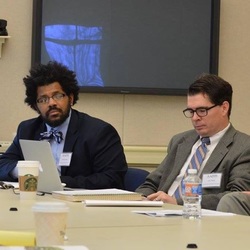About Carson

W.E.B. Du Bois panel at African American Intellectual History Society Conference
Edward Carson is a Dean and historian of race and religion in America’s 20th century; he earned his undergraduate and graduate degrees in History and Biblical Christianity from Harding University. Carson attended Alabama Christian Academy in his hometown of Montgomery. He teaches seminars on African American Studies, Race, Class, Gender, American Jesus, and Black Christianity. His current research examines race and ideology, particularly that of W.E.B. Du Bois. Carson is the co-author of Historical Thinking Skills and Socialism and Democracy in the Life And Thought of W.E.B. Du Bois. His working manuscript is entitled W.E.B. Du Bois’s Editorial Influence on Black Life in America. He has published and presented papers focusing on Black identity, religion, Du Bois, and equity and Inclusion. He is a leading organizer and activist in Greater Boston.
He recently published a book chapter entitled "W.E.B. Du Bois: A Communist and A Socialist" through Oxford University Press The Oxford Handbook of W.E.B. Du Bois. He is the former editor of The Christian Century Magazine Then and Now and the Christian Scholars’ Conference Civil Rights Committee. Carson recently joined the Board of Trustees for the School of Hope. Read more about Carson's passion for teaching in an interview conducted by the American Historical Association. He has presented papers and workshops and sat on panels at leading diversity, equity, and inclusion conferences regarding race and inclusive policies in independent schools, as well as at historical association conferences.
He recently published a book chapter entitled "W.E.B. Du Bois: A Communist and A Socialist" through Oxford University Press The Oxford Handbook of W.E.B. Du Bois. He is the former editor of The Christian Century Magazine Then and Now and the Christian Scholars’ Conference Civil Rights Committee. Carson recently joined the Board of Trustees for the School of Hope. Read more about Carson's passion for teaching in an interview conducted by the American Historical Association. He has presented papers and workshops and sat on panels at leading diversity, equity, and inclusion conferences regarding race and inclusive policies in independent schools, as well as at historical association conferences.